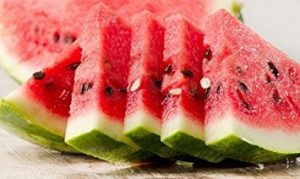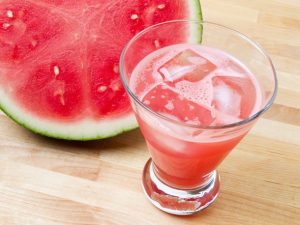7 Health Benefits Of Eating Watermelon
Watermelons are mostly water, about 92 percent-but this refreshing fruit is soaked with nutrients. Each juicy bite has significant levels of vitamins A, B6 and C, lots of lycopene, antioxidants and amino acids. There’s even a modest amount of potassium.
Below are 7 health benefits of eating watermelon;
1.Helps You Hydrate
Drinking water is an important way to keep your body hydrated. However, eating foods that have a high water content can also help. Interestingly, watermelon is 92% water. A high water content is one of the reasons that fruits and vegetables help you feel full. The combination of water and fiber means you’re eating a good volume of food without a lot of calories.
2. Good For Skin And Hair
Two vitamins in watermelon — A and C — are important for skin and hairhealth. Vitamin C helps your body make collagen, a protein that keeps your skin supple and your hair strong. Vitamin A is also important for healthy skin since it helps create and repair skin cells. Without enough vitamin A, your skin can look dry and flaky. Both lycopene and beta-carotene may also help protect your skin from sunburn.
Contains nutrients and beneficial plant compounds
As far as fruits go, watermelon is one of the lowest in calories — only 46 calories per cup. That’s lower than even “low-sugar” fruits such as berries.
A cup (154 grams) of watermelon has many other nutrientsas well, including these vitamins and minerals:
- Vitamin C: 21% of the RDI
- Vitamin A: 18% of the RDI
- Potassium: 5% of the RDI
- Magnesium: 4% of the RDI
- Vitamins B1, B5 and B6: 3% of the RDI
Watermelon is also high in carotenoids, including beta-carotene and lycopene. Plus, it has citrulline, an important amino acid.
Here’s an overview of watermelon’s most important antioxidants:
Vitamin C
Vitamin C is an antioxidant that helps prevent cell damage from free radicals.
Carotenoids
Carotenoids are a class of plant compounds that includes alpha-carotene and beta-carotene, which your body converts to vitamin A.
Lycopene
Lycopene is a type of carotenoid that doesn’t change into vitamin A. This potent antioxidant gives a red color to plant foods such as tomatoes and watermelon, and is linked to many health benefits.
Cucurbitacin E
Cucurbitacin E is a plant compound with antioxidant and anti-inflammatory effects. Bitter melon, a relative of watermelon, contains even more cucurbitacin E.
In short, watermelon is a low-calorie fruit high in some nutrients, especially carotenoids, vitamin C and cucurbitacin E.
According to studies in obese postmenopausal women and Finnish men, lycopene may also help reduce the stiffness and thickness of artery walls. Watermelon also contains citrulline, an amino acid that may increase nitric oxide levels in the body. Nitric oxide helps your blood vessels expand, which lowers blood pressure. Other vitamins and minerals in watermelon are also good for your heart. These include vitamins A, B6, C, magnesium and potassium.
4. Improves Digestion
Watermelon contains lots of water and a small amount of fiber — both of which are important for healthy digestion. Fiber can provide bulk for your stool, while water helps keep your digestive tract moving efficiently. Eating water-rich and fiber-rich fruits and vegetables, including watermelon, can be very helpful for promoting normal bowel movements. Thus, fiber and water are important for healthy digestion. Watermelon contains both.
5. Lowers Blood Pressure
Hypertension, or high blood pressure, is the most common condition seen in primary care and commonly leads to heart attacks, strokes, and other fatal diseases if untreated. Watermelon is rich in citrulline, which is an amino acid that is converted to arginine in the body. In turn, both citrulline and arginine help in the production of nitric oxide, which is a vasodilator, meaning that it helps relax and dilate your blood vessels.
When the vessels are dilated, more blood can pass freely through, leading to lower blood pressure and less of a risk for such things as stroke and cardiac infractions. Even better, the carotenoids present in watermelon help prevent the hardening of arteries and veins, thereby also helping reduce the risk of blood clots and atherosclerosis.
Clinical trials have shown that supplementation with watermelon and watermelon juices can actually reduce your aortic blood pressure and may even provide cardioprotection to keep your heart healthy and working smoothly.
Male pattern baldness is a landmark in time that no man wants to pass. On the other hand, just as unwanted is the thinning of hair in women as they age. The effect of hair loss is not just a superficial physical effect, but it has also been documented that is takes an emotional toll on the patient as well. The mammalian hair follicle contains papilla and dermal sheath cells and undergoes a cycle of growth as the follicle ages. Certain growth factors are believed to cause the epithelial cells in the hair follicle tissues to proliferate and differentiate, leading to thicker and more abundant hair.
Since a derivative of vitamin C, l-Ascorbic acid 2-phosphate, is known to stimulate human fibroblasts and osteoblasts, researchers have suggested that such a supplement may be useful for hair growth.
Indeed, when hair follicles were isolated and treated with this compound, scientists saw significant growth stimulation in dermal papilla cells as well as an elongation of the hair shaft.
Such findings may suggest that vitamin C promotes the growth of hair follicles, which is one more reason why vitamin C-rich watermelon should be an essential part of everyone’s diet.
7. Aids In Weight Loss
Because watermelon is composed of so much water, it is by no means unusual to hear that eating watermelon may help to reduce fat or lose weight. This property of the fruit, however, may be attributed to more than just its high water content. The high levels of citrulline in watermelon mean that when our body processes this amino acid it can convert it into another amino acid called arginine. Recently, several studies have been finding evidence that the more conversion there is from citrulline to arginine, the more the amino acids block the activity of an enzyme called tissue-nonspecific alkaline phosphatase, TNAP. Interestingly, blocking the metabolic activities of this enzyme may help to prevent excess accumulation of fat in fat cells. The reason this occurs is thought to begin with arginine’s function in the body. Researchers have found that arginine stimulates lipolysis and the expression of several genes responsible for fatty acid oxidation. The more fatty acids that are oxidized into carbon dioxide and water, the more your body also reduces your amount of stored body fat.
Although more research must be done in this area to specifically prove arginine’s role in helping reduce body fat, it certainly cannot hurt to make sure you have enough arginine and watermelon in your daily diet!










